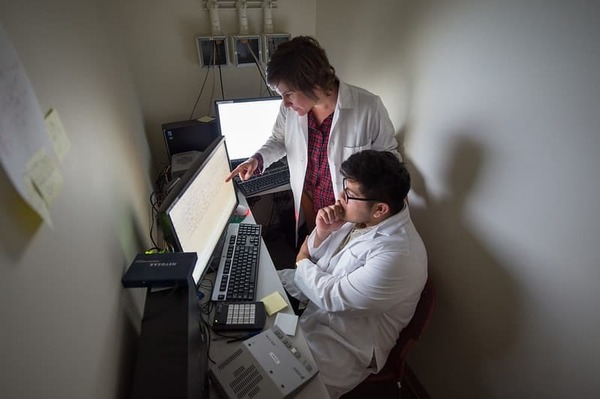Cognition, Brain, and Behavior
Why pursue a Ph.D. in cognition, brain, and behavior at Notre Dame?

The Notre Dame cognition, brain, and behavior (CBB) graduate program is focused on helping you develop the skills necessary to undertake research related to human cognition, to learn about a broad range of human cognitive abilities and the factors that influence them, and to communicate these understandings to others.
We are committed to the richness and diversity of the discipline by helping you build bridges between various scientific approaches and techniques. Traditional behavioral measures of human performance are coupled with eye tracking, computational modeling, virtual reality, TMS, measures of brain activity, pharmacological, and neuropsychological methods.
Our faculty
The teaching and research interests of our faculty are diverse and represent various subfields such as:
- attention
- learning
- memory
- language
- cognitive development and aging
- affect and cognition
- applied cognition
We encourage you to work with multiple faculty members with different specializations to develop integrated analyses of cognitive research questions.
Professionalization
In our program, you will be trained to develop and conduct your own research, speak across traditional disciplinary boundaries, and publish the innovative contributions of your research. Your experience may be supplemented by the Cognition Brain and Behavior area’s close relationships with other departments, centers, and institutes on campus.
We are committed to providing you with the instruction, experience, support, and encouragement to help you reach your career goals. When you graduate, you will be well prepared for work in academia and in research positions in the private and non-profit sectors. Many of our students go on to teach and do research as university faculty members in psychology and related disciplines; or pursue research opportunities in fields where developmental science can make a difference in the lives of children, parents, families, and communities.
Learn more about graduate professional development
Contact
Have questions about the graduate program in cognition, brain, and behavior? Contact:
Dr. Kathleen Eberhard
Area Director - Cognition, Brain, and Behavior
Email: keberhar@nd.edu